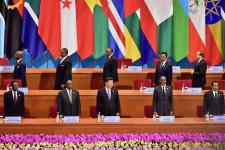Competition with China and other emerging actors

Global/Mega trend
In the past two decades, China has gained much influence in Africa through economic activities. While the largest holders of foreign assets in Africa are European and the US is the largest aid donor, China has become the largest trading partner, biggest bilateral official lender of loans, and the top source of foreign direct investment (FDI) flow in the past ten years. China has also increased security presence in Africa through dual-use infrastructure, conflict mediation and peacekeeping, and anti-piracy missions. However, the growth of Chinese financing in Africa has declined because of the Covid-19 pandemic, China’s economic slowdown, and its more cautious approach towards financial and political risks. There have also been pushbacks in African communities against social and environmental problems and state-elite collusion or corruption.
Other actors are expanding their presence in Africa too, including Japan, India, Russia, South Korea, Turkey, Saudi Arabia, UAE, and Qatar. They are active in infrastructure (both basic and economic, both civil and dual use), energy (both fossil and green), agriculture, mining, industrial parks or trade zones, manufacturing (for both the African and international markets), and digitalization. Like China, their focus in development cooperation with Africa tends to be mutually beneficial businesses, and basic aid and governance reforms come secondary.
Apart from natural resources, Africa has economic dynamism, important geostrategic locations, and an increasing bargaining power. Many African countries, and the Global South in general, think the US’s value-based foreign policy is hypocritical. They do not believe in a liberal Western order, and they do not welcome lecturing from Western actors. Together with other Global South countries, African countries are asserting their agenda and identity on their own matters as well as in global governance.
Implications for/in Africa
African countries don’t like conditionalities attached to Western aid that impose (liberal) political and economic governance, and they welcome other sources of financing with no such strings attached. Engagement with China and other emerging actors offers alternative economic opportunities and development models. Some African countries are inspired by the Chinese model of a strong state, active foreign trade and investment, and support to national companies. How to support Africa to develop in an environmentally, socially, and financially sustainable way is an important question for all stakeholders including Denmark.
As there is still a big development gap in African countries, they are keen to develop the economy, create jobs, improve infrastructure and living standards, and move up the value chain. Some countries are faced with an economic, humanitarian, environmental, or political crisis. They welcome economic opportunities and green initiatives that suit the local context from wherever the source is. Even though China may not attach its political interests as conditions to financing, most African states support China in global fora like the UN and Bretton Woods institutions. Similar politico-strategic relations are developing between African states and emerging actors. Maintaining or increasing the influence of Denmark in Africa requires a pragmatic approach that creates jobs and brings economic growth in African countries.
Strategic concerns and dilemmas for Denmark
For Denmark to expand presence and gain influence in Africa vis-à-vis China and other countries, the following options of development cooperation can be considered, each with their dilemma.
Financing: A significant expansion from aid to commercial financing of loans, investments, and trade facilitation is required. African countries especially welcome financing that are readily available, so that projects can start quickly. Danish financial institutions and companies also need to take a longer-term view on risks because many big projects or projects in developing countries take a long time to realise and make a profit. It can be helped by Danish government or host country guarantees. A combination of concessional and commercial financing can be used to reduce the price, attract private financing, and signal government commitment.
The dilemma is that it can increase financial risks for Denmark and debts of African countries; corruption and misuse of money can happen without proper oversight; and it is difficult to compete with China in the total amount of financing.
Conditionality: No conditionality on democratization or economic liberalization is attached to commercial financing. Instead, more focus is laid on engagement with stakeholders, environmental and labour standards, and social impacts.
One dilemma is a contradiction in spirit to the norms of the OECD’s Development Assistance Committee (DAC). And another dilemma is how to promote liberal values and facilitate reforms of good governance, especially in authoritarian countries.
Content: Denmark becomes more active in making businesses—economic infrastructure, green transition, trade & industrial zones, agriculture, manufacturing, and services industries. The initiation of projects involves asking the host countries about their wishes. The projects prioritize hiring local workers and technology transfer.
The dilemma is that poverty reduction, social and public projects can be overlooked; the host country government’s wishes may not represent the interests of the public; Danish companies may not immediately find enough African workers; the price level is difficult to compete with China and some others.
Support to companies: The Danish government becomes more active in organising Danish or international consortiums to provide full packages of financing, products and services that cover different stages and parts of projects in Africa. The government can also facilitate Danish-African joint ventures and organize trade delegations to visit Africa. Danish financing can be tied to Danish products and services.
The dilemma is that it contradicts DAC principle of non-tied aid in spirit. Some Danish companies may be reluctant to participate, and foreign companies may also be needed in consortiums. The success and failure of projects will reflect more directly in the Danish government’s reputation.
Third-party cooperation: Denmark collaborates more with other countries and international actors in development cooperation in Africa. Apart from joint financing or joint ventures, Denmark can contribute with environmental, technological, logistical, and business know-how. Denmark’s like-minded countries, the World Bank, and African Development Bank (AFDB) are natural candidates for partnership, but others including China, Asian Infrastructure Investment Bank (AIIB), and the New Development Bank of BRICS countries can also be possibilities.
The dilemma for Denmark is how to have influence if its economic share is small; the difficulty of protection of intellectual property rights (IPRS); and how not to compromise Denmark’s principles and standards.
DIIS Experts


